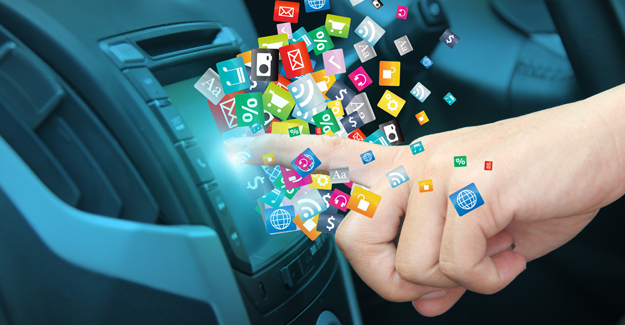The equivalent of flight mode for cars?
Three in five drivers would be happy to use a ‘vehicle safe mode’ on their mobile phones and other electronic devices they bring into their car in order to avoid being distracted.
Drivers are increasingly connected to the outside world, both through in-built vehicle technology and also the portable devices they bring with them to the driving seat, including: mobiles, smart phones and watches, tablets and computers.
But the ever increasing array of technology means the risk of driver-distraction is also increasing.
However a survey by Ipsos MORI for the RAC Foundation shows the British public – drivers or not – recognise that connected technology has the potential to harm as well as help. More than two-thirds (69%) see information received from outside the car as a possible distraction to safe driving.
Three-fifths (60%) of drivers say they would be happy to use a safe mode which would prevent such devices and systems doing anything to distract them.
This same group of people were shown a list of seventeen connected driving features and asked which they would consider important when buying a car. The top choices were:
1) Information about the condition of the car (85%)
2) Live traffic/congestion alerts (81%)
3) Sat navs (79%)
Some 9% considered online gaming to be important, which came bottom of the list.
More generally, the bulk (77%) of the British public say that technology makes life better.
Three in five (61%) of drivers say they are interested in connected driving technologies.
Steve Gooding, director of the RAC Foundation, said:
“On aircraft there is often a requirement that phones be put in ‘flight safe’ mode so they don’t interfere with a plane’s systems. Now this survey tells us the majority of motorists would back a ‘car safe’ mode to prevent mobiles interfering with a driver’s concentration.
“Reassuringly, the vast majority of people said they wanted to use technology to check the state of their vehicle and make their journeys easier, not to read Facebook messages, send texts or email the boss.
“However, almost one in ten were interested in online gaming as a feature. One can only hope this is down to a desire to keep their children occupied during a long journey rather than because they are tempted to play themselves.
“There was a time when transport connectivity referred solely to how easy it was to get from A to B: how well are places ‘connected’? But with the telecoms revolution there is increasing debate around connected cars and drivers. Technology brings us huge benefits. We just need to make sure it does so safely.”
Ben Marshall, Research Director at Ipsos MORI, said:
“This survey further underlines the public’s appetite for technology. Drivers who are already connected mostly report improved driving experiences but they, and the wider public, also worry about the potential for distraction and safety. The study reveals that most people want to do the right thing when it comes to road safety – they just need some help from product manufacturers.”
Research by the RAC Foundation in November 2015 showed that the ability to best use smart phone technology is limited by network coverage.
There are 14,554 miles of road (6% of British roads) where there is a complete absence of 3G coverage. An additional 111,679 miles of road (45%) have only partial 3G coverage.
ENDS
Contacts:
RAC Foundation:
Philip Gomm – Head of External Communications
[email protected] | 020 7747 3445 | 020 7389 0601 (ISDN) | 07711 776448
Notes to editors:
The RAC Foundation is a transport policy and research organisation that explores the economic, mobility, safety and environmental issues relating to roads and their users. The Foundation publishes independent and authoritative research with which it promotes informed debate and advocates policy in the interest of the responsible motorist. The RAC Foundation is a registered charity, number 1002705.
Ipsos MORI conducted a representative online survey of 2,175 members of the public aged 16 to 75 in Great Britain, between 5 October and 8 October 2015. Data is weighted to the known population profile.
Several of the questions were posed only to the group ‘drivers’ – rather than the whole of the adult population – and in this case drivers are defined as those who are “currently driving a car or van, as well as people who said they were looking to buy a car in the next year or two”.
This a link to the report on the Ipsos MORI survey:



